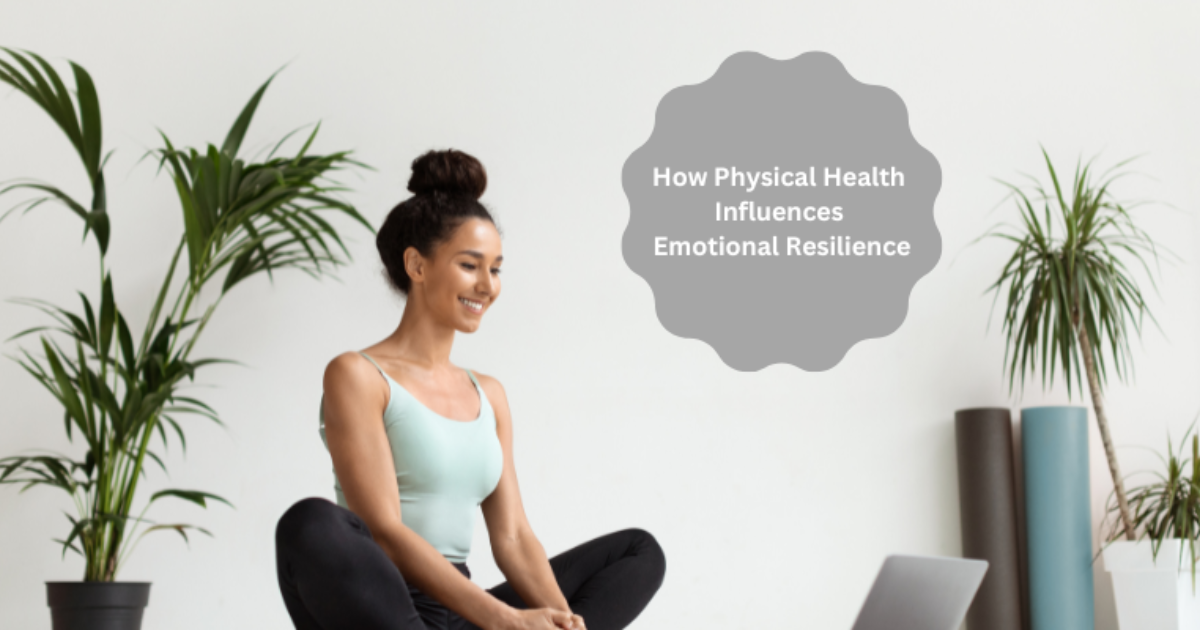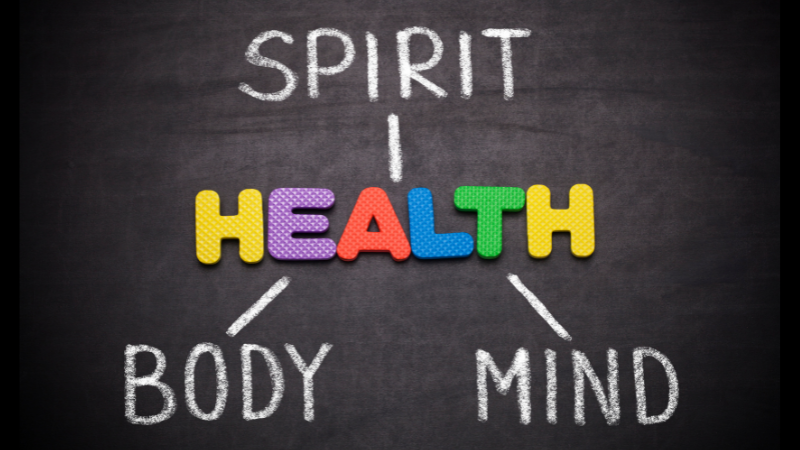
How Physical Health Influences Emotional Resilience: Mind-Body Connection
- November 14, 2023
- Brain-Boosting Foods
- 0 Comments
Have you ever wondered how your physical health affects your emotional resilience? In fact, when your body is healthy, it helps your mind stay strong. That’s what we call ‘mind-body connection.’
In this journey, you’ll know how simple things like exercise, healthy eating, and good sleep directly impact how well you handle life’s ups and downs.
But first, let’s explore what the mind-body connection is!
Table of Contents
What Is ‘Mind-Body Connection’?
The mind-body connection is the overall wellness’s fundamental aspect. It signifies your mental-physical state’s intricate interplay. It acknowledges your biology can be impacted positively/negatively by these factors:
- Emotions
- Thoughts
- Beliefs
- Attitude

Consider the scenario of preparing for a significant presentation or job interview: The mind signals to the body that stress is imminent and leads to physiological responses. For example, you’ll see increased heart rate and sweating.
Moreover, the relationship is bidirectional; just as mental states influence physical reactions, physical health also affects mental well-being, especially mental clarity.
Regular exercise, for instance, triggers the release of endorphins, natural mood enhancers that can alleviate depression and anxiety. In the next part of this blog, let’s dig deeper into physical health’s impacts on emotional resilience.
Read more: Creating Harmony Within How to Find Your Balance and Thrive.
5 Impact Of Physical Health On Emotional Resilience
Emotional resilience refers to the ability to adapt to and bounce back from stress, adversity, and challenges. The physical health’s impacts on emotional resilience are profound. Here are some of them:
#1. Stress Regulation

First, let’s talk about how keeping physically fit can kick stress to the curb and boost your emotional resilience.
When you exercise and maintain a healthy lifestyle, your body releases endorphins. They’re your body’s natural stress busters. Plus, working out helps dial down those stress hormones, like cortisol.
Now, why does this matter for your emotional resilience? When you’re physically fit, your body copes with challenges more smoothly, making you more resilient.
What happened next? You handle setbacks better and bounce back more easily. In the end, you keep that positive vibe alive.
#2. Loneliness Reduction

Do you know how staying active can be a game-changer in beating loneliness? Imagine joining a workout class, hitting the gym, or just going for a walk with a buddy.
In such cases, physical activity fosters social connections. You meet people, share some laughs, and suddenly, loneliness fades.
And here’s the kicker: The camaraderie developed through shared physical activities creates a support network, a crucial element in combating loneliness. So, you build a fortress against the loneliness problems when you’re part of a group.
#3. Neurotransmitter Balance
Neurotransmitters are chemical messengers facilitating communication between nerve cells in the brain. Some notable neurotransmitters include:
- Serotonin: Regulates mood, appetite, and sleep.
- Dopamine: Influences motivation, reward, and pleasure.
- Norepinephrine: Affects attention, alertness, and stress response.
- GABA (Gamma-Aminobutyric Acid): Inhibits nerve transmission, promoting relaxation.
- Glutamate: Facilitates excitatory nerve signals, important for learning and memory.
You’re giving your brain the VIP treatment when you eat well with a brain diet, exercise regularly, and get enough sleep. These habits help keep the above neurotransmitters in check.
For example, when you hit the gym, you boost your serotonin level. Eating right ensures your brain has the suitable nutrients to make those neurotransmitters. And when you have a good night’s sleep, it’s like a reset button for your brain.
As a result, you’re building emotional resilience.
Read more: How Nutrition Impacts Mental Well-being
#4. Improved Sleep

Physical health evolves through regular exercise, which has been linked to improved sleep duration and quality.
Physical activity helps regulate circadian rhythms and reduces symptoms of insomnia. Also, maintaining a healthy weight through regular exercise can alleviate conditions like sleep apnea, enhancing overall sleep patterns.
Moreover, a balanced diet, rich in nutrients, supports the production of sleep-regulating hormones like melatonin.
Adequate sleep, in turn, is a cornerstone of emotional resilience. It fosters the ability to cope with stress, regulates mood, and enhances cognitive function.
When well-rested, you are better equipped to face life’s challenges. In other words, you’ll demonstrate heightened emotional stability and resilience.
#5. Strong Immune System
A healthy body is an essential ingredient for the immune system. Here is a table to tell you how this happens:
| Factor | Role in a Strong Immune System |
| Regular Exercise | Boost immune cell activity and circulation. |
| Nutritious Diet | Provide vital vitamins & minerals for the immune system. |
| Adequate Rest | Support immune cell regeneration and overall recovery. |
| Hydration | Ensure proper functioning of immune cells and processes. |
An immune system is a formidable defense against infections and chronic diseases. It’s like having an internal army ready to thwart invaders.
Besides physical health, a good immune function boosts mental and emotional well-being. As a result, it bolsters emotional resilience in the face of stress and adversity.
How To Improve Physical And Emotional Health
Improving physical and emotional health involves adopting a holistic approach encompassing various lifestyle factors. Here are some recommendations:
- Regular exercise: Incorporate activities you enjoy, whether walking, jogging, or dancing. As mentioned, exercise enhances physical well-being and, at the same time, releases endorphins.
- A balanced diet: Focus on whole foods (vegetables, fruits, lean proteins, and whole grains). Adequate hydration is equally important for both physical and emotional well-being.
- Prioritize sleep: Establish a consistent sleep routine (aiming for 7-9 hours of quality sleep each night).
- Manage stress: Try mindfulness, meditation, or deep breathing exercises.
- Nurture social connections: Maintain harmonious relationships with friends and family, engage in activities that promote social interaction, and seek support when needed.
- Consider professional help if necessary: Therapy or counseling can provide valuable tools for managing emotions and navigating life’s challenges.
It’s a journey of small, sustainable changes collectively contributing to a healthier, happier life. Just follow these tips. You’ll have a better life!
Conclusion
In wrapping up the look at how taking care of your body affects your emotional resilience, it’s clear: Staying active, eating well, and getting good sleep isn’t just about physical health.
These habits also impact how you handle tough times and stress. It’s like having a defense system for your emotions.
By making small, healthy choices, you boost your mood, handle stress better, and even create connections with others. Don’t worry! You’re not alone in this journey. Mentalmapguide is always here with you!






